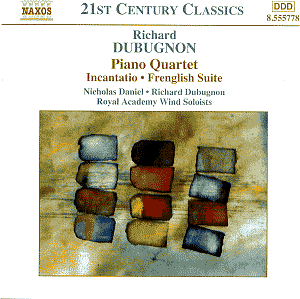Richard Dubugnon is making quite a name for himself,
and deservedly so. His musical language, like his lineage, is
truly European. He was born in Lausanne, which is both Swiss and
French. He trained in France but has since received commissions
from festivals in England, France, Switzerland and Germany. He
was a composition pupil of Paul Patterson at the Royal Academy
of Music in London. It is particularly apt therefore that the
Royal Academy Wind soloists are recorded here in his ‘Frenglish’
Suite. He is also a double bass player (and often performs with
contemporary music groups in Britain) of considerable standing.
This can be witnessed in his own performance of his early ‘Trois
Evocations finlandaises’ inspired by a visit to Finland and featuring,
in its central movement, a Finnish tune the composer notated whilst
there. This piece should be snapped up to swell the limited repertoire
available to solo bassists.
From Paul Patterson he has learned how to reconstruct
tonality and to use it in an original way. This is a particular
feature of all of these pieces but the striking Piano Quartet
is especially noteworthy in this regard. It is even cited as being
inspired by Fauré’s C minor quartet, not a bad model. He
takes from tonality its strengths of key contrast and form. He
uses indeterminate tonality where he wishes to create a deliberate
insecurity at moments of tension. His music also has a rhythmic
drive as in the Presto movement of the Piano Quartet, a work in
just two movements. There is a deep lyricism as in ‘Incantatio’
inspired by the apparition of a poltergeist! It also contains
humour. There is a wonderful photograph, in the booklet, of the
bemused composer staring out of the window of a little Renault
with his double bass protruding from the sunroof. Zany humour
is also found especially in the Frenglish Suite (O dear what a
title!) with its theme from ‘Geordie’ country hotly pursued by
a set of attractive and clever variations. If, like many Europeans,
Dubugnon is bi- or even tri-lingual then the ‘Frenglais Suite’
with its ‘Funèbre Lullaby’ and its final ‘Fermeture’ is
suitably poly-European and ideal for our times. No wonder it is
played with so much obvious pleasure.
The ‘Canonic verses’ are delightful miniatures,
possibly a little too short to make a point and for most promoters
to go to the trouble of getting a oboe d'amore player and a cor
anglais. It is a particular joy to hear the wonderful Nicholas
Daniel on the oboe here and even more so in the beautiful and
attractive ‘Cinq masques’ for solo oboe. What a lucky composer
to get this music originally written for Anne-Catherine Beach
recorded by such a fine player. Incidentally Beach possesses a
set of mural masks and "I decided to write a piece for each
of them" (Dubugnon) they consist of ‘Arlequin’, ‘Masque Etrusque’,
‘Masque de Pompei’ and so on. The music is witty and virtuosic
and entirely in keeping with the style of the composer who seems
to have formed his language so early and is sticking with it.
Similar virtuosity can be heard in the finale
of the ‘Frenglish suite’ and Dubugnon, although a string player,
has a particular facility in writing brilliantly for the woodwind.
In a sense this CD acts a sort of ‘carde de visite’
for the young composer, stretching as it does across the first
ten years of his fully creative life. It is projects like this
which all composers need. But how very enterprising of Naxos to
support young composers in this way. The booklet notes, written
by the composer, mention a major orchestral ballet ‘Horrificques’
of 1997. Perhaps Naxos might be persuaded to record that in the
near future.
The performances are exemplary and the recording
is focused, strong and ideally balanced.
Gary Higginson
